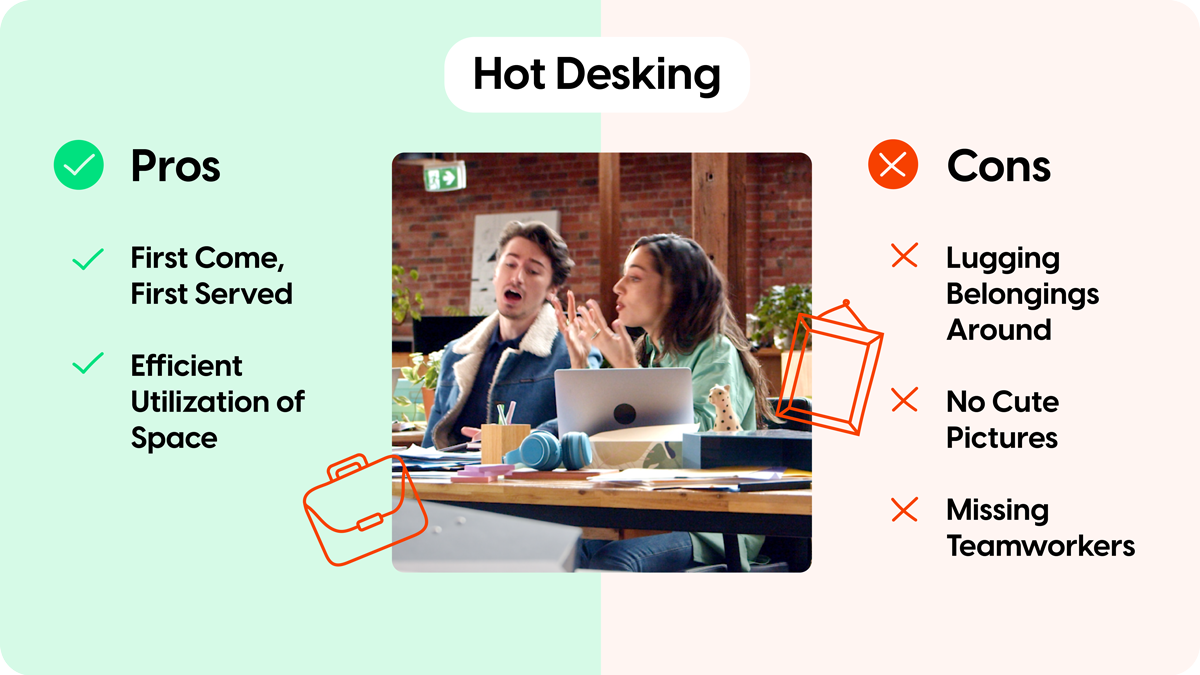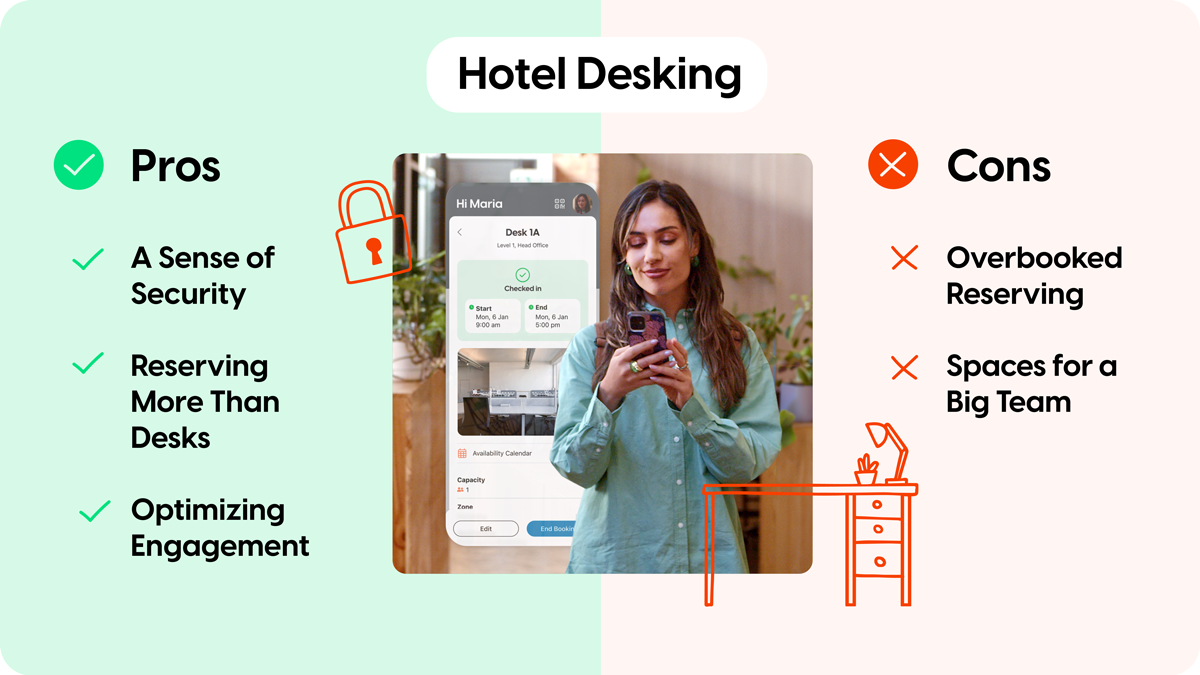Hot Desking vs Hoteling: Choosing the Right Approach for Your Office

Gone are the days when arriving at work meant a straightforward beeline to your personal corner of the office. In recent years the workplace has shifted. Now, hot desking and hoteling are redefining the office environment and the employee experience to boot.
What started back in the 1990s as savvy strategies to cut costs and optimize office layouts has blossomed into the heartbeat of today’s hybrid work culture. The concept is simple: desks are either up for grabs or bookable in advance. This means no more ghost desks on the days your team works remotely. Instead, your flexible office space becomes vibrant and ever-changing.
In this article, we'll explore the difference between hot desking and hoteling, the pros and cons of each approach, and which may be right for your office environment.
What Is Hot Desking?
Do you remember playing musical chairs? The music began, and when it stopped, you had to lunge for an open chair and not be the last person standing. Hot desking is a little like that, only not so dramatic. There are always enough desks to go around as long as the resources are managed correctly.
Why is it called "hot desking"? The name refers to a desk that's "hot" because it's always in use.
Hot desking creates an open seating environment. Employees arrive and select an available desk or workstation. According to a Morgan Stanley survey as reported by Marketplace, the end of 2023 saw about one-third of office workers reporting their employers were integrating hot desking.

Pros of Hot Desking
First Come, First Served
If you like going to a restaurant that doesn't take reservations, you'll probably lean toward this approach. You get the desk you get. It's a system that incentivizes your staff to arrive early, particularly if they have a favorite desk they've earmarked.
Efficient Utilization of Space
Hot desking can have a significant effect on floor space requirements. In some cases, this effect is so dramatic that businesses can opt for smaller offices, saving money. They may also choose to move to a more desirable location or a building that aligns with their brand.
Cons of Hot Desking
Lugging Belongings
Without a set desk, employees are required to bring what they might need and lug it around, such as laptops and files.
No Cute Pictures
Some employees like to create a personal space. It may contain pictures of their family, pets or inspirational quotes. Unless they carry these in their backpack every day, the personal memorabilia will have to stay behind. On the plus side, the office environment looks more professional, organized, and tidy.
Missing Teamworkers
Because all work areas are up for grabs, people may find they're far removed from the team members they usually work with. That's where smart planning comes in, ensuring spaces for group engagement as well as solo tasks. Some employers divide workspaces into sections, ensuring teams are in the same areas.
What Is Hoteling or Hotel Desking?
Hotel desking is similar to hot desking in that no one has a desk to call their own. The difference is that, like a hotel, employees can reserve a desk. For administrators, that may sound like a lot more work. For employees who like to feel a sense of security, it offers relief.
Fortunately, there is a way to integrate hoteling without it becoming a logistical nightmare (it's called SwipedOn, but we'll get to that later 💅 ).
Pros of Hotel Desking
A Sense of Security
For workers who enjoy predictability, hotel desking ensures they know which desk they're working at in advance. There are no sweaty palms or disappointed forehead furrows when they see their intended desk is already inhabited.
Reserving More Than Desks
Systems like SwipedOn enable employees to reserve more than desks with its space management software. In fact, there's no limit to the resources you can include.
Optimizing Engagement
Because employees can schedule their desks in advance, they can ensure they're in the same vicinity as others working on the same project. And with analytics about space usage at your fingertips, it's easy to see what spaces are popular and if all real estate is being used effectively.
Cons of Hotel Desking
Overbooked
Just like a hotel, there's a chance that a desk may be double-booked. Solutions to this dilemma are a coin toss, a quick game of rock, paper, scissors, or, better yet, easy-to-use desk booking software.
Reserving Spaces for a Big Team
As you've undoubtedly experienced when buying tickets to a concert or sporting event, it's much easier to get the seats you want when you're attending with one or two people instead of a crowd. The same goes for hoteling. One strategy to overcome this challenge is offering private offices, large tables, or huddle spaces for group reservations.
Factors To Consider in Choosing Between Hot Desking or Hoteling
So, which is best to integrate into your office environment: hot desking or hoteling? As both result from the effects of flexible scheduling, it's clear that they'll become more mainstream as time advances. Is there a better solution for your team?
Many of the pros and cons overlap between the two. Both offer the efficient use of space and reduce an employee's ability to create a personal space. Hot desking provides greater flexibility, but that flexibility comes with a risk. What if there are not enough available desks, or a group can't find the right space to collaborate, and you have no oversight as to why the system isn't working for your workforce? The result looks like reduced productivity, unhappy staff and no insight into why.
On the other hand, hoteling means a guaranteed desk, as long as they make a reservation. Like a hotel, you'll need a virtual floor plan and a service that makes it easy for staff to book their desired desk.
And that's where SwipedOn comes in. Our desk booking software provides an interactive map, letting everyone see desk availability in real time and who has booked which desks nearby. You can restrict desks by departments to ensure people who need to work together can. In addition to desks, staff can reserve equipment, company vehicles, and more.
This birds-eye-view visibility lets you see which resources and spaces your employees use and which are sitting vacant, supporting future planning. Are you ready to experience an easy approach to hoteling desks? Try out our space management software or desk booking software in our 14-day free trial (see below).









 Germany - Deutsch
Germany - Deutsch